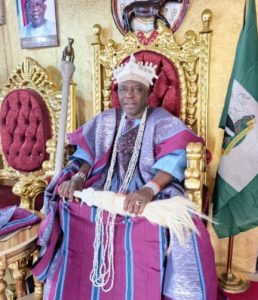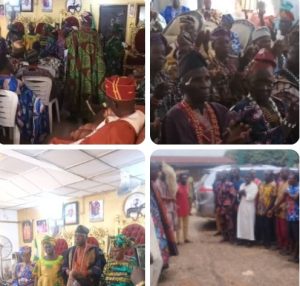

By Dada Ahmed.

In many African societies, the throne is more than a symbol of culture and heritage. It is also a fortress of protection and leadership, where the welfare and security of subjects remain a sacred duty. This reality played out in Isanlu Isin,an aggragrian community in Kwara State, North Central Nigeria,recently where the Olusin, His Royal Highness, Oba (Dr.) Solomon Olugbenga Oloyede, took a decisive step to protect his people from escalating insecurity.

Against the backdrop of rising threats from bandits and criminal gangs, Oba Oloyede directed the profiling of citizens without ancestral root with the people of his community but share residence with them and the surrounding areas. This he expressed optimism, would serve as a complementary role to the government’s push to effectively check insecurity in the area.The measure, according to the revered traditional ruler, is not an act of discrimination but a pragmatic response to ensure that only peace-loving residents live within the community.
The directive, which followed a series of security consultations with chiefs, ward heads, vigilantes, women leaders, youths, and even representatives of non-indigenous groups, underscores the seriousness with which the monarch views his responsibility. For him, peace is non-negotiable, and safety is the highest form of service he can render to his people.
“Our bushes and forests must be safeguarded against infiltration, as that is critical to preventing attacks and ensuring peace in Isanlu Isin,” the monarch declared, signaling that the traditional council would no longer tolerate suspicious strangers or unidentified visitors.
According to experts on culture and tradition,in a society where insecurity often thrives on the anonymity of criminals, the Olusin’s approach aims to separate genuine residents from potential infiltrators. This, he believes, will help restore trust, reduce panic, and empower local security structures to operate more effectively.
To reassure his subjects, Oba Oloyede emphasized that the profiling exercise was not meant to intimidate law-abiding residents. According to the Oba,the exercise was designed to protect them,stressing that both indigenes and non-indigenes who contribute positively to the growth of Isanlu Isin would continue to find accommodation under his reign.
The monarch’s words were not just promises; they came with action. He revealed that security agencies and local vigilantes had been fully mobilized to safeguard lives and property and urged citizens to remain vigilant, share timely intelligence, and see security as a collective responsibility.
By recognizing and commending the sacrifices of vigilantes and security operatives, the Olusin demonstrated the value of community-driven defense systems. Their efforts, he assured, would be acknowledged and rewarded, sending a clear message that the fight against insecurity is a shared mission.
Many citizens of the community note that the urgency of the traditional ruler’s directive is not misplaced. They based their observation on the fact that Isanlu Isin has endured its share of tragedy. Recent attacks by bandits forced residents to block the Ilorin–Lokoja highway, a desperate cry for help that highlighted both their frustration and the neglect they feel from government authorities.
For the community, this was not rebellion but survival. The roadblock was a dramatic reminder that when leaders fail to act, ordinary people are pushed to defend themselves. The monarch’s intervention, therefore, represents both a shield and a voice for his distressed people.
Residents lamented that armed gangs now roam their forests with alarming freedom, instilling fear and disrupting daily life. Farmers are afraid to go to their fields, traders feel unsafe in markets, and children attend school under the shadow of danger.
Community leaders stressed the need for local, state, and federal governments to intensify efforts in ensuring safety of life and property.This they argue, will make them feel that they are not abandoned,a development they added is capable of pushing them to take their destiny into their own hands,if not checked on time.It is in this void that the Olusin’s complementary leadership role becomes more critical.
Speaking for the residents,the Vice President , Isanlu Isin Development Association, Dr. Jacob Ayanda,lamented the suffering of women, children, and the elderly who now live in constant fear. He warned that without urgent intervention, the community risks social collapse. His call extended beyond the palace to President Bola Tinubu, the Nigeria Police, and the Nigerian Army for decisive action.
He enumerated the demands of the people for the restoration of peace in the community to include;immediate rescue operations, the flushing out of bandits and replacement of destroyed vigilante motorcycles, among others.
He expressed concern that the blood of slain loved ones remained unaccounted for, adding the fate of the missing law abiding residents has continued to haunt their attackers.
In the end, the Olusin’s directive highlights the enduring relevance of traditional rulers in today’s Nigeria. Beyond the rituals and pageantry of the throne lies an age-old covenant, which emphasised that the king must protect his people. By stepping forward at a time of despair, Oba Oloyede not only reaffirmed his love for his subjects but also reminds the wider society that true leadership is measured by the ability to safeguard lives, preserve peace, and give hope where fear once reigned.
Ahmed publishes The Reporters.


